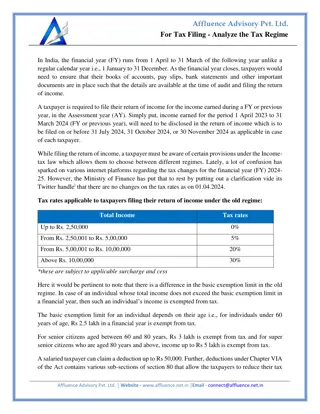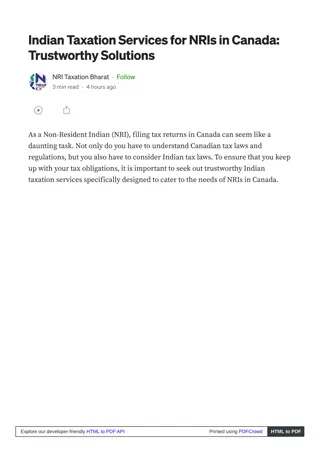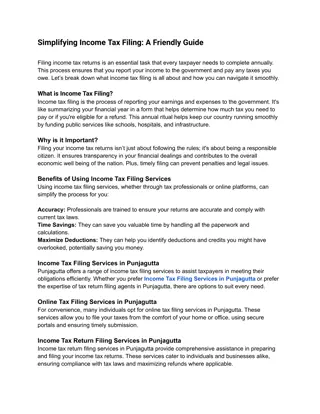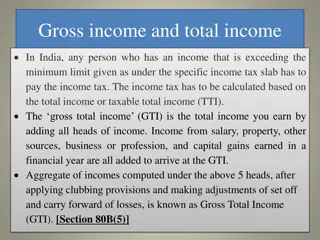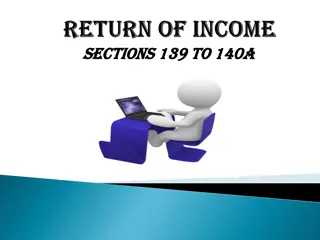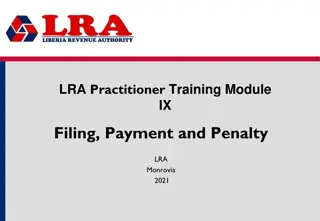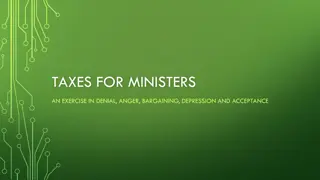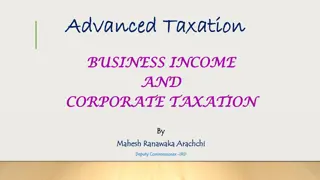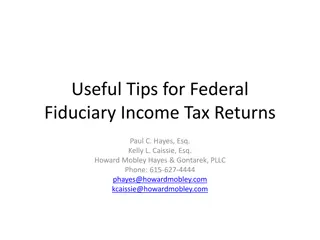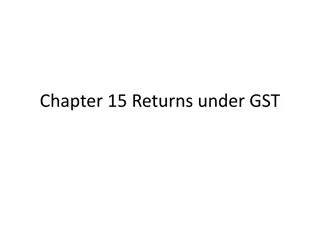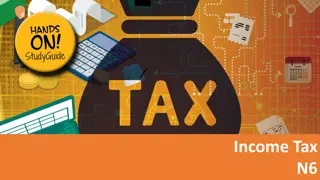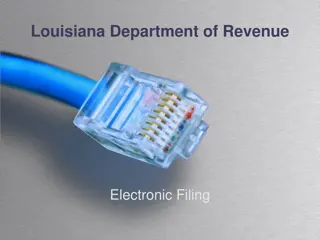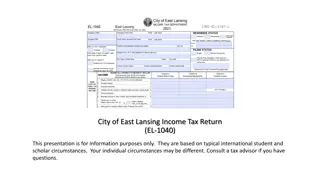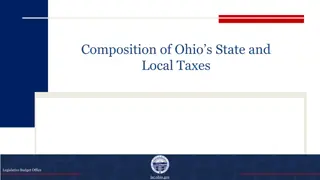Income Tax Filing and the 1040 Form Basics
Income tax is a mandatory duty for all earning individuals in the U.S., involving sources like paychecks, investments, and more. Learn about filing, W-2 vs. 1099 forms, the 1040 return form, who needs to file taxes, and possible corrections. Get insights on requirements for U.S. citizens, immigrant workers, and Americans living abroad to successfully fulfill their tax obligations.
Download Presentation

Please find below an Image/Link to download the presentation.
The content on the website is provided AS IS for your information and personal use only. It may not be sold, licensed, or shared on other websites without obtaining consent from the author.If you encounter any issues during the download, it is possible that the publisher has removed the file from their server.
You are allowed to download the files provided on this website for personal or commercial use, subject to the condition that they are used lawfully. All files are the property of their respective owners.
The content on the website is provided AS IS for your information and personal use only. It may not be sold, licensed, or shared on other websites without obtaining consent from the author.
E N D
Presentation Transcript
Income Tax Filing and the 1040 Personal Finance Lab
Income Tax 101 What? Income tax is the tax you pay on your income, usually directly taken out of your paycheck. Everyone who works in the United States should be paying income tax on their earnings. This also includes other sources of income such as investments, interest on saving accounts, rents from rental properties ect. How? For most people, income taxes are straightforward employers are required to withhold the appropriate income tax amount from your paycheck, which is then paid to the government without any extra steps. If you are self employed or work for an independent contractor, like Uber, you must file your taxes on your own.
Who Files Income Taxes? All US citizens and everyone working and living in the United States needs to file an income tax return each year. By extension, all citizens and workers in the US need to report their income, even if that income is earned in another country. Us citizens use their social security number to file income taxes. Immigrant Workers Workers who work in the United States without a Social Security Number (both legal immigrants and undocumented workers) are still required to pay income taxes. Those who do not have a Social Security Number, can request an Individual Tax Identification Number (ITIN) from the IRS to use to file their taxes. US Citizens Living Abroad US Citizens who live and work in other countries are also required to file their US income taxes each year or risk heavy fines. While citizens do need to file their taxes, most citizens living and working outside the US are exempt from actually owing any tax, unless they have exceptionally high incomes.
Form W2 & 1099 W2 The W-2 form is a document all hourly and salaried employees will receive from their employer at the end of the year (usually in January, covering the previous year). The W-2 form is a fairly basic form outlining the total wages earned in the previous year, along with how much Social Security and Income Tax was already withheld by the employer and paid. Employees receive their W-2 form already filled out from their employer. 1099 This is the form that you would use if you need to self-report your income. This dorme is a little more complicated because you have to fill out the form yourself so it required more detail and attention.
The 1040 Income Tax Return Form 1040 This is the most common income tax return for in the US. The basic use of the form is to add up all your income from the year from all sources, calculate how much tax you have already paid, subtract any deductions you qualify for, and see how much of a tax return you should receive or how much tax you currently owe.
Income Tax Corrections Taxpayers have 7 years in the United States to file any corrections. Usually this would be to claim deductions you may have missed, or report income later to avoid tax evasion penalties. IRS Corrections The IRS may also apply corrections directly based on their own calculations of your taxes owed. If this is the case, they will generally mail you a letter explaining how their calculation differs from theirs, along with a method to dispute their calculation. Audit There is a small chance that your income tax could be audited by the IRS, in which case they will ask you to bring in supporting documents. Audits are designed both to ensure the tax returns are using all the correct values, and to prevent fraudulent claims.
State Income Tax Most states also levy an income tax, but the actual tax amount and thresholds will vary quite a lot from state to state. The way you file state tax is very similar to filing federal tax. There are currently seven states with no income tax: Alaska, Florida, Nevada, South Dakota, Texas, Washington, and Wyoming. States that do not charge income tax make up for the lost revenue through other channels, usually sales taxes and use taxes (in fact, states with no income tax typically charge their citizens higher total taxes than those who do have income taxes).


